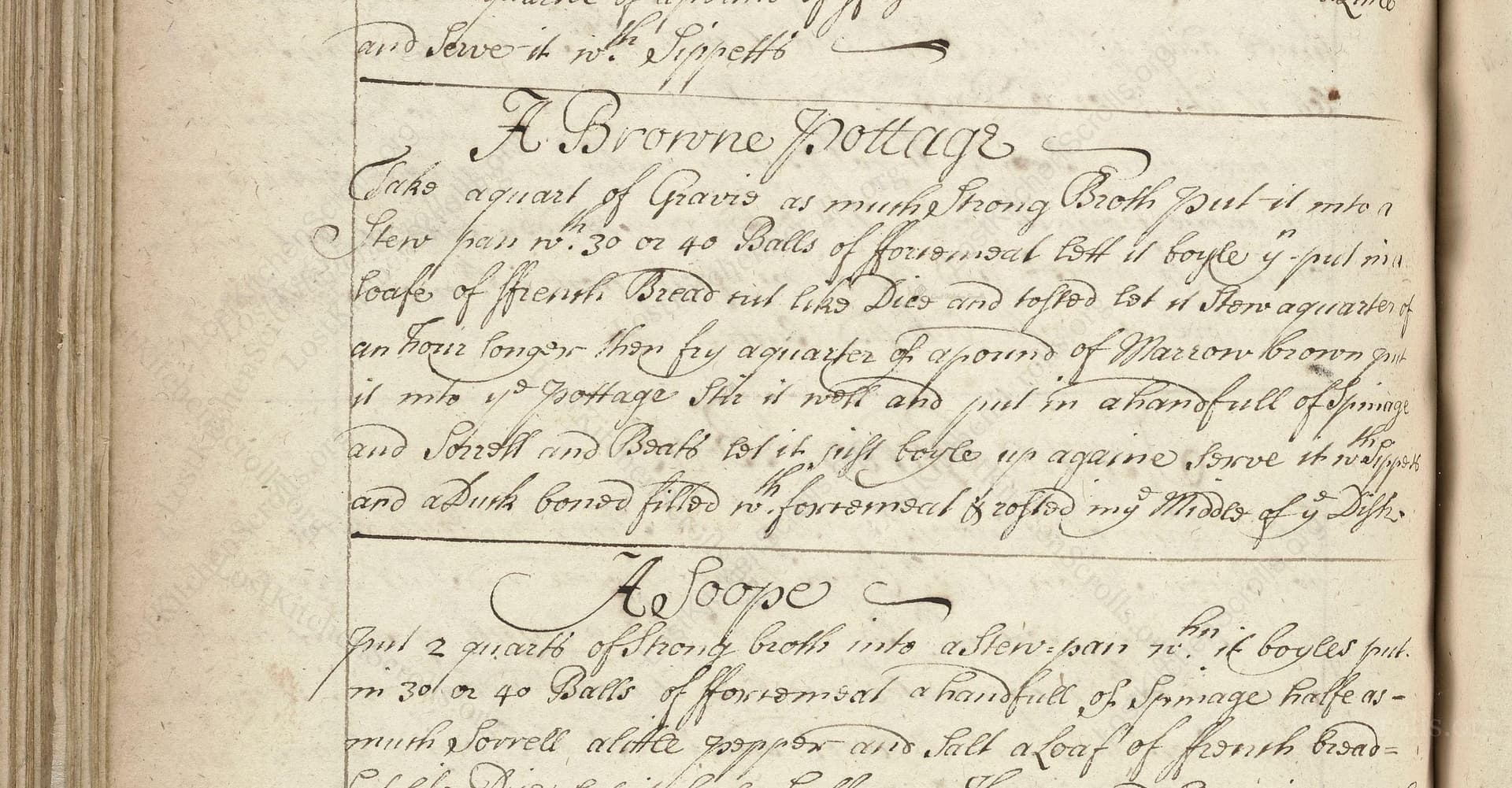A Browne Pottage
From the treasured pages of Cookbook of Grace Blome, Kent
Written by Grace Randolph

A Browne Pottage
"Take a quart of Gravie as much Strong broth put it into a stew pan wth 30 or 40 balls of forcemal lett it boyle 1/4 put in a bread cut like Dice and tossed let it stew a quarter of an hour then say a quarter of a pound of Marrow browne put it into ye pottage still it well and put in a handfull of spinage boyle lett it just boyle up againe serve it with Sippetts and filled wth forcemeal & tossed in ye middle of ye dish"
Note on the Original Text
The recipe is written in the style of late 17th-century English manuscripts: short, practical sentences, minimal punctuation, and a reliance on the cook’s technique and judgment. Spelling is phonetic ('boyle' for 'boil', 'ye' for 'the'), and weights are often given approximately. Directions blend steps together, expecting the reader to be familiar with terms like 'forcemeal' (forcemeat) and 'sippets' (toasted bread), all of which were common culinary language of the time.

Title
Cookbook of Grace Blome, Kent (1697)
You can also click the book image above to peruse the original tome
Writer
Grace Randolph
Era
1697
Publisher
Unknown
Background
A delightful glimpse into late 17th-century kitchens, this culinary collection by Grace Randolph tempts taste buds with refined recipes and elegant flavors fit for a well-to-do English household. Journey through a banquet of historic treats and timeless techniques!
Kindly made available by
Folger Shakespeare Library
This recipe for 'A Browne pottage' comes from the late 17th century, specifically from the manuscript of Grace Randolph (1674-1750), dated to 1697. The recipe reflects the era's fascination with rich, hearty broths and elaborate garnishing, often using ingredients like bone marrow, bread, and forcemeat. Dishes like this were commonly served at grand tables, offering a warming, nourishing, and visually appealing centerpiece. Such pottages were everyday fare among the wealthy, demonstrating both culinary skill and access to varied ingredients.

The original cook would have used a sturdy iron stew pan or cauldron over an open hearth fire. Knives were used for dicing bread and making forcemeat balls. A skillet or small pan was essential for browning marrow, and wooden spoons were the mixing instruments of choice. Sippets were toasted on an iron griddle or in front of the fire, and the entire dish was likely served in a deep earthenware or metal bowl.
Prep Time
15 mins
Cook Time
30 mins
Servings
6
We've done our best to adapt this historical recipe for modern kitchens, but some details may still need refinement. We warmly welcome feedback from fellow cooks and culinary historians — your insights support the entire community!
Ingredients
- 4 1/4 cups rich meat gravy
- 4 1/4 cups strong beef broth (or substitute with chicken broth for a lighter taste)
- 30-40 small forcemeat balls (beef, veal, or mixed pork & veal, about 1/3 oz each)
- 5 1/2 oz crusty white bread, diced
- 1/2 oz unsalted butter for tossing bread
- 4 oz beef marrow (or substitute with extra butter or suet if marrow unavailable)
- 1 3/4 oz fresh spinach leaves
- Sippets (3 1/2 oz): Small pieces of bread, sliced oblong and toasted or fried
Instructions
- Begin by pouring 4 1/4 cups of rich meat gravy and 4 1/4 cups of strong beef broth into a large saucepan.
- Bring to a gentle boil.
- Prepare 30 to 40 small beef or veal forcemeat balls (seasoned meatballs, about 1/3 to 1/2 oz each) and add them to the pan.
- Let the mixture simmer for 15 minutes.
- Meanwhile, dice around 5 1/2 oz of crusty white bread and toss it in a little butter.
- Add the bread cubes to the pan, letting everything stew for another 15 minutes.
- After this, stir in about 4 oz of beef bone marrow, previously browned gently in a frying pan until golden, and then add a generous handful (about 1 3/4 oz) of fresh spinach leaves.
- Allow the pot to come just back to the boil, then serve immediately with sippets (small oblong pieces of toasted or fried bread) arranged in the serving dish, packing more forcemeat balls into the center for dramatic effect.
Estimated Calories
350 per serving
Cooking Estimates
It takes about 15 minutes to prep the meatballs, bread, marrow, and spinach, and about 30 minutes to cook. Each serving has around 350 calories and this recipe makes 6 servings.
As noted above, we have made our best effort to translate and adapt this historical recipe for modern kitchens, taking into account ingredients nowadays, cooking techniques, measurements, and so on. However, historical recipes often contain assumptions that require interpretation.
We'd love for anyone to help improve these adaptations. Community contributions are highly welcome. If you have suggestions, corrections, or cooking tips based on your experience with this recipe, please share them below.
Join the Discussion
Rate This Recipe
Dietary Preference
Main Ingredients
Occasions

Den Bockfisch In Einer Fleisch Suppen Zu Kochen
This recipe hails from a German manuscript cookbook compiled in 1696, a time whe...

Die Grieß Nudlen Zumachen
This recipe comes from a rather mysterious manuscript cookbook, penned anonymous...

Ein Boudain
This recipe comes from an anonymous German-language manuscript cookbook from 169...

Ein Gesaltzen Citroni
This recipe, dating from 1696, comes from an extensive anonymous German cookbook...
Browse our complete collection of time-honored recipes



